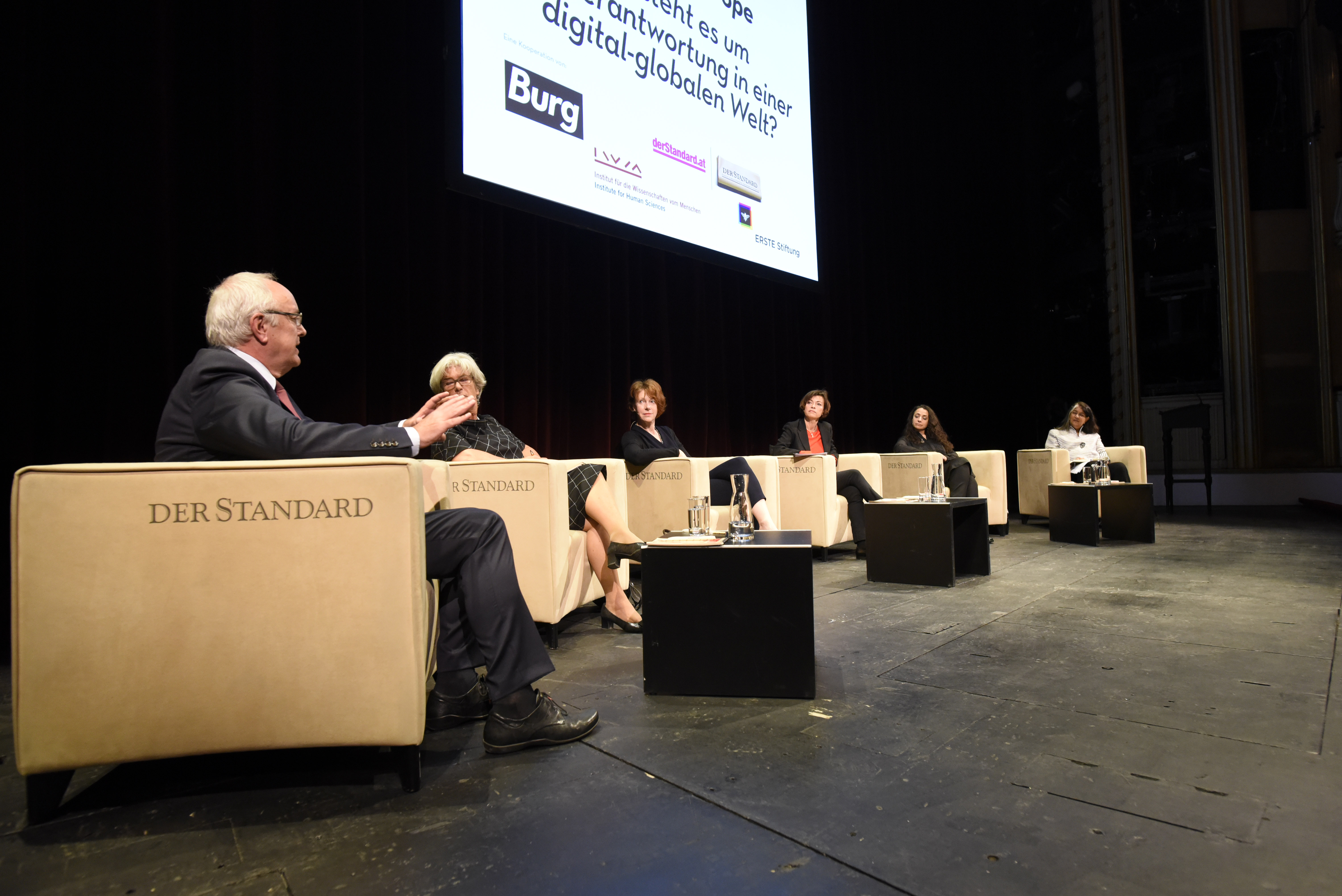Be it war, climate change, migration or flight and expulsion: Where does personal responsibility start? And above all: Where does it end? Within your own family? With your neighbour? In your own country?
With this in mind, the issue for the public Sunday morning debate was: “What are today’s attitudes towards responsibility in a digital global world?” As part of the Debating Europe series, the event was organised by the Institute for Human Sciences (IWM), ERSTE Foundation, Burgtheater, the German Embassy and Austrian daily Der Standard.
To commemorate the anniversary of the Reformation – 500 years ago Martin Luther posted his theses –, five experts gathered at Vienna’s Burgtheater to find answers to this question. Protestant bishop Michael Bünker, political scientist Ulrike Guérot, sociologist and IWM director Shalini Randeria, peace activist and Protestant theologian Viola Raheb, and former leader of Liberales Forum Heide Schmidt, all participated in the debate.

Debating Europe at the Burgtheater: Michael Bünker, Heide Schmidt , Ulrike Guérot, Renata Schmidtkunz, Viola Raheb, Shalini Randeria. Photo: © Matthias Cremer/Der Standard
No borders
Host Renata Schmidtkunz, head of the Ö1 serial radio programme Im Gespräch, opened the debate with a quotation from Luther: “Here I stand. I can do no other.” She wondered how relevant it was to stand up for one’s own beliefs, to have a conscience in a country such as Austria that, for example, protects freedom of speech and of the press. Heide Schmidt suggested that this approach confuses theory and practice because in her opinion these principles are not always put into practice. Schmidt also warned that a certain sentiment was being created, as “if responsibility ends at the border”.
Political scientist Guérot and sociologist Randeria primarily see a change in society. As Guérot put it, we live in an “individualistic, fragmented society”. Randeria said that society is understood more as a family, which allows for different relationships: “I can exclude people, and say that they don’t belong to my family.” Belief in progress is a thing of the past, concluded Bünker and asked: “How can we enable everyone in the country to have a good life?” Schmidt had already made her suggestion: with an unconditional basic income.
The marginalised
According to theologian Raheb, however, the borders that were mentioned do not only constitute injustices with respect to other countries in the world: “Marginalised people are also to be found here – not only in Africa.” And she concluded: “What does this mean in view of 15 October when the parliamentary elections take place?” This was an issue raised by all the participants. Sociologist Randeria pointed to the existing restrictions to voting rights: “I pay taxes in Germany, Austria and Switzerland – and nowhere am I allowed to vote.” This applies to hundreds of thousands of migrants across Europe, she added.
Heide Schmidt came back to this point in saying that people who stand up for their principles must fear negative consequences – even in politics. By way of example, she cited parliamentarians who could no longer be nominated by their party. Without referring to him by name, she criticized Sebastian Kurz, chairman of the Austrian People’s Party, on this matter: “If everyone is hired by one leader, that just makes the situation worse.”
While for Guérot the “authoritarian temptation is again an issue”, Bünker warned of social benefit cuts, but he also said: “I’m not an optimist, but my hopes are indestructible.” To which Viola Raheb added: “Hope is what we do.”
The original article has been published on 2 October at derstandard.at. With courtesy of derstandard.at (Peter Mayr, 2.10.2017)
Debating Europe
Responsibility in a Digital Global World
Sunday, 1 October 2017, 11 am, Burgtheater Vienna
“Here I stand. I can do no other.” (Martin Luther)
Self-responsibility and individualism – two important attributes of the Reformation, both theologically and sociologically. How about taking up position today? For what do religious people take up position? Is that still needed? Or are societies without religion doing better?
Panelists:
Michael Bünker
Bishop of the Evangelical Church in Austria
Ulrike Guérot
Political scientist and author
Viola Raheb
Peace activist and theologist
Shalini Randeria
Rector IWM; Sociologist and social anthropologist
Heide Schmidt
Austrian politician
Moderator: Renata Schmidtkunz
Head of Ö1-series “Im Gespräch”
“Debating Europe” is a cooperation of the Institute for Human Sciences (IWM), ERSTE Foundation, Burgtheater and Der Standard. With support of Ö1 and the German Embassy Vienna.
